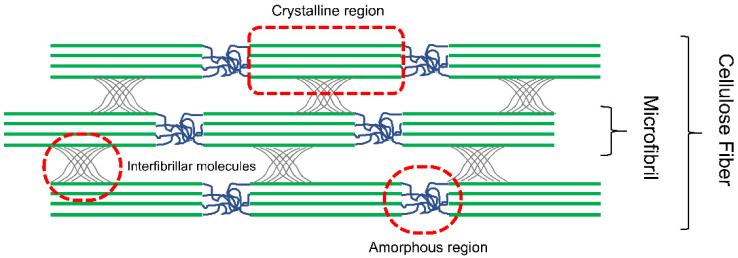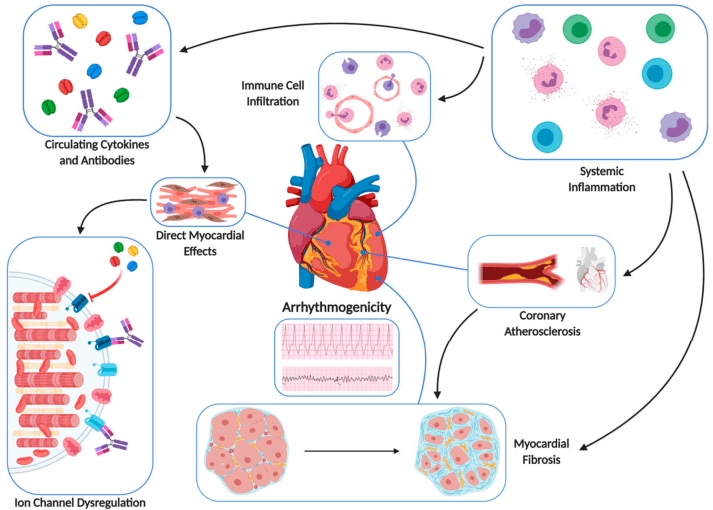NAA Services for Anti-Interfibrillary (IFA) Antibody
Creative Biolabs has successfully constructed a series of innovative and diversified NAA platforms to provide fast and convenient services for our worldwide customers. With over a decade of experience and the state-of-the-art technology platforms, we can totally meet your projects' requirements and budgets in the anti-interfibrillary (IFA) marker services for diseases diagnosis and related researches. Our professional team is optimized to help you get success in your NAA program.
Background of Anti-interfibrillary (IFA) Antibody
Anti-Interfibrillary antibodies (IFAs) are a group of autoantibodies against interfibrillary proteins that related to heart diseases. Similar to the anti-fibrillary antibody (AFA), IFA is also a kind of heart autoantibodies that can be frequently detected in some pathologic processes, such as myocarditis, dilated or congestive cardiomyopathy, heart failure, even systemic autoimmune diseases. IFA is a heart-specific antibody which is different from the muscle-specific antibody (AFA) and nonorgan-specific antibody (anti-mitochondrial antibody).
 Fig.1 Cellulose's crystalline and amorphous portions, as well as the interfibrillar network among cellulose molecules.1
Fig.1 Cellulose's crystalline and amorphous portions, as well as the interfibrillar network among cellulose molecules.1
The Role of Anti-interfibrillary (IFA) in Myocarditis
Myocarditis is an inflammation of the heart muscle or myocardium that decreases the ability of the heart to pump blood normally. The clinical presentations of myocarditis are different, such as abnormal heartbeat and breath, fatigue and ankle swelling, chest pain. It can be caused by viral infections, bacterial infections, autoimmune disorders, and toxins, of which banal viral infections are the main inducement. Myocarditis is a major cause and a common precursor of heart failure due to dilated cardiomyopathy. Evidence indicates that auto-immune or auto-inflammatory processes are involved in myocarditis, and NAAs may provide a new sight for targeted diagnosis and therapies of myocarditis.
Several circulating autoantibodies induced by infections have been described by playing a crucial role in the progression and induction of myocarditis. Researches have been performed early in 1983 and showed that IFA in serum was significantly higher in patients with primary dilated cardiomyopathy, alcoholic dilated cardiomyopathy and post-myocarditic dilated cardiomyopathy than that in healthy persons. The levels of IFA are also higher than other heart autoantibodies such as anti-sarcolemmal antibody, anti-myolemmal antibody, and AFAs. Moreover, IFA of IgG and IgM type in congestive cardiomyopathy was remarkably increased even compared with hypertrophic cardiomyopathy. We deduce that IFA may also be developed as one of the biomarkers for myocarditis and cardiomyopathies, but further research and verification are needed.
 Fig.2 The role of autoantibodies in autoimmune inflammatory cardiomyopathy.2
Fig.2 The role of autoantibodies in autoimmune inflammatory cardiomyopathy.2
Let’s Work Together to Fulfil Your NAA Project
In terms of anti-interfibrillary antibody, Creative Biolabs has accumulated abundant relevant research experience. Moreover, aided by our established platforms and professional Ph.Ds, we are pleased to offer extensive NAA services, from NAA detection, NAA profiling, to NAA epitope mapping. In addition, a full range of NAA products and applications, custom services are also available if you need.
Therefore, if you are working on NAA researches or you are interested in NAA related sections, just contact us and tell us what you are confused. Our professional teams and specialized scientists are able to provide the best and comprehensive services at all times.
References
- Jaffar, Syafiqah Syazwani, et al. "Recent Development and Environmental Applications of Nanocellulose-Based Membranes." Membranes 12.3 (2022): 287.
- Mavrogeni, Sophie I., et al. "Arrhythmogenic inflammatory cardiomyopathy in autoimmune rheumatic diseases: a challenge for cardio-rheumatology." Diagnostics 9.4 (2019): 217.
Related Services:
- NAA Services for Anti-Sarcolemmal Antibody (ASA)
- NAA Services for Anti-Myolemmal Antibody (AMLA)
- NAA Services for Anti-Fibrillary Antibody (AFA)
- NAA Services for Anti-laminin Antibody
- NAA Services for Anti-β1 Receptor Antibodies
- NAA Services for Anti-M2 Receptor Antibodies
- NAA Services for Anti-MHC Antibodies
- NAA Services for Anti-HSP 70 Antibodies
- NAA Services for Anti-Tropomyosin Antibodies

